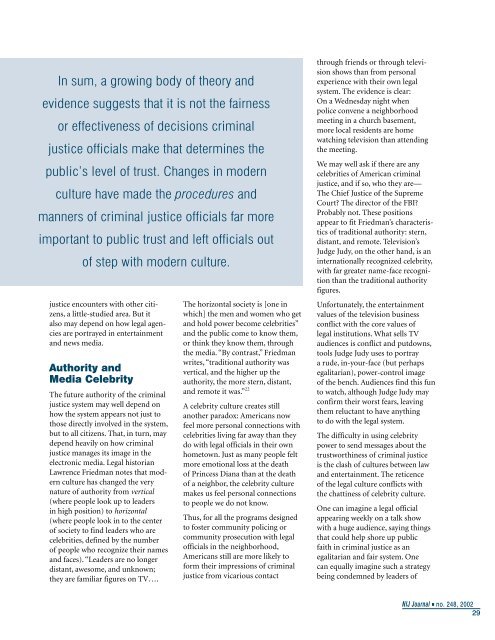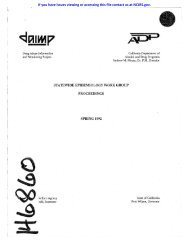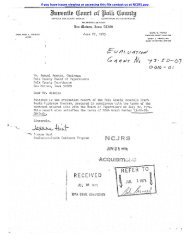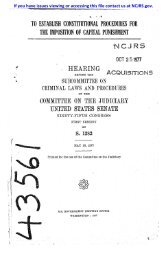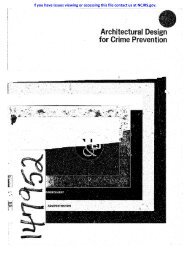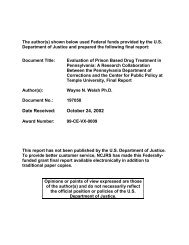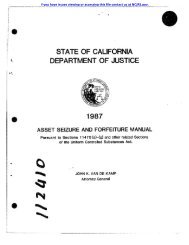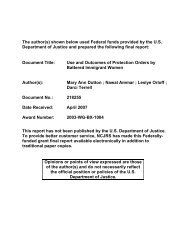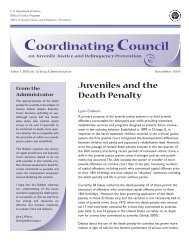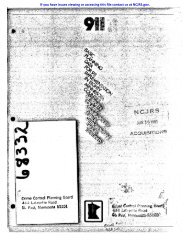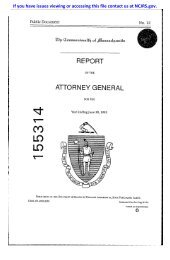Trust and Confidence in Criminal Justice - National Criminal Justice ...
Trust and Confidence in Criminal Justice - National Criminal Justice ...
Trust and Confidence in Criminal Justice - National Criminal Justice ...
Create successful ePaper yourself
Turn your PDF publications into a flip-book with our unique Google optimized e-Paper software.
In sum, a grow<strong>in</strong>g body of theory <strong>and</strong><br />
evidence suggests that it is not the fairness<br />
or effectiveness of decisions crim<strong>in</strong>al<br />
justice officials make that determ<strong>in</strong>es the<br />
public’s level of trust. Changes <strong>in</strong> modern<br />
culture have made the procedures <strong>and</strong><br />
manners of crim<strong>in</strong>al justice officials far more<br />
important to public trust <strong>and</strong> left officials out<br />
of step with modern culture.<br />
justice encounters with other citizens,<br />
a little-studied area. But it<br />
also may depend on how legal agencies<br />
are portrayed <strong>in</strong> enterta<strong>in</strong>ment<br />
<strong>and</strong> news media.<br />
Authority <strong>and</strong><br />
Media Celebrity<br />
The future authority of the crim<strong>in</strong>al<br />
justice system may well depend on<br />
how the system appears not just to<br />
those directly <strong>in</strong>volved <strong>in</strong> the system,<br />
but to all citizens. That, <strong>in</strong> turn, may<br />
depend heavily on how crim<strong>in</strong>al<br />
justice manages its image <strong>in</strong> the<br />
electronic media. Legal historian<br />
Lawrence Friedman notes that modern<br />
culture has changed the very<br />
nature of authority from vertical<br />
(where people look up to leaders<br />
<strong>in</strong> high position) to horizontal<br />
(where people look <strong>in</strong> to the center<br />
of society to f<strong>in</strong>d leaders who are<br />
celebrities, def<strong>in</strong>ed by the number<br />
of people who recognize their names<br />
<strong>and</strong> faces). “Leaders are no longer<br />
distant, awesome, <strong>and</strong> unknown;<br />
they are familiar figures on TV….<br />
The horizontal society is [one <strong>in</strong><br />
which] the men <strong>and</strong> women who get<br />
<strong>and</strong> hold power become celebrities”<br />
<strong>and</strong> the public come to know them,<br />
or th<strong>in</strong>k they know them, through<br />
the media. “By contrast,” Friedman<br />
writes, “traditional authority was<br />
vertical, <strong>and</strong> the higher up the<br />
authority, the more stern, distant,<br />
<strong>and</strong> remote it was.” 22<br />
A celebrity culture creates still<br />
another paradox: Americans now<br />
feel more personal connections with<br />
celebrities liv<strong>in</strong>g far away than they<br />
do with legal officials <strong>in</strong> their own<br />
hometown. Just as many people felt<br />
more emotional loss at the death<br />
of Pr<strong>in</strong>cess Diana than at the death<br />
of a neighbor, the celebrity culture<br />
makes us feel personal connections<br />
to people we do not know.<br />
Thus, for all the programs designed<br />
to foster community polic<strong>in</strong>g or<br />
community prosecution with legal<br />
officials <strong>in</strong> the neighborhood,<br />
Americans still are more likely to<br />
form their impressions of crim<strong>in</strong>al<br />
justice from vicarious contact<br />
through friends or through television<br />
shows than from personal<br />
experience with their own legal<br />
system. The evidence is clear:<br />
On a Wednesday night when<br />
police convene a neighborhood<br />
meet<strong>in</strong>g <strong>in</strong> a church basement,<br />
more local residents are home<br />
watch<strong>in</strong>g television than attend<strong>in</strong>g<br />
the meet<strong>in</strong>g.<br />
We may well ask if there are any<br />
celebrities of American crim<strong>in</strong>al<br />
justice, <strong>and</strong> if so, who they are—<br />
The Chief <strong>Justice</strong> of the Supreme<br />
Court? The director of the FBI?<br />
Probably not. These positions<br />
appear to fit Friedman’s characteristics<br />
of traditional authority: stern,<br />
distant, <strong>and</strong> remote. Television’s<br />
Judge Judy, on the other h<strong>and</strong>, is an<br />
<strong>in</strong>ternationally recognized celebrity,<br />
with far greater name-face recognition<br />
than the traditional authority<br />
figures.<br />
Unfortunately, the enterta<strong>in</strong>ment<br />
values of the television bus<strong>in</strong>ess<br />
conflict with the core values of<br />
legal <strong>in</strong>stitutions. What sells TV<br />
audiences is conflict <strong>and</strong> putdowns,<br />
tools Judge Judy uses to portray<br />
a rude, <strong>in</strong>-your-face (but perhaps<br />
egalitarian), power-control image<br />
of the bench. Audiences f<strong>in</strong>d this fun<br />
to watch, although Judge Judy may<br />
confirm their worst fears, leav<strong>in</strong>g<br />
them reluctant to have anyth<strong>in</strong>g<br />
to do with the legal system.<br />
The difficulty <strong>in</strong> us<strong>in</strong>g celebrity<br />
power to send messages about the<br />
trustworth<strong>in</strong>ess of crim<strong>in</strong>al justice<br />
is the clash of cultures between law<br />
<strong>and</strong> enterta<strong>in</strong>ment. The reticence<br />
of the legal culture conflicts with<br />
the chatt<strong>in</strong>ess of celebrity culture.<br />
One can imag<strong>in</strong>e a legal official<br />
appear<strong>in</strong>g weekly on a talk show<br />
with a huge audience, say<strong>in</strong>g th<strong>in</strong>gs<br />
that could help shore up public<br />
faith <strong>in</strong> crim<strong>in</strong>al justice as an<br />
egalitarian <strong>and</strong> fair system. One<br />
can equally imag<strong>in</strong>e such a strategy<br />
be<strong>in</strong>g condemned by leaders of<br />
NIJ Journal ■ no. 248, 2002<br />
29


